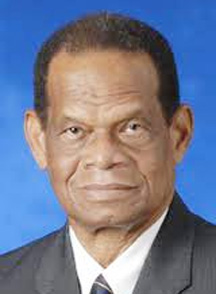It’s an easy guess to determine the type of spin the West Indies Cricket Board (WICB) will use to cover up the team’s recent embarrassing One- Day International series loss to lowly Bangladesh.
Winning the Test series and the solitary T20 game will be trumped up to such an extent, that the 3-2 defeat in the Sahara series would seem non-existent.
The Julian Hunte administration’s political machinery has a predictable playbook to defend its long running inefficiencies but, as hard as they try, no defense could gloss over the historic defeat for the once proud Windies.
Yes, Bangladesh had never before defeated in a series, any full strength team from any of the major countries ranked above them in all formats of the game.

Their poster boy captain Darren Sammy once again made a mess of the tactics in the final deciding game which West Indies would have won under the leadership of any of the other experienced players in the team.
Ridiculing Sammy has been a favourite pastime for many West Indian cricket fans ever since he accepted the captaincy of the West Indies senior team and he added fuel to the fire in Bangladesh.
West Indies batted poorly in the three matches they lost, but had Sammy not made bone-headed decisions in the use of his bowlers in Dhaka, the series result would have been reversed.
With Bangladesh struggling at 30 runs for three wickets, chasing the 211-run target, West Indies were well poised to repeat their rout of the home team for 136 runs, like they had done two days prior to win the fourth game.
Anyone following’s Sammy’s leadership of the team, had their worst fears realized as he promptly and inexplicably eased the pressure. He began by not extending Kemar Roach’s fiery spell into the sixth over on the trot, like he had done in the previous day that had the home team reeling.

Sammy then added insult to injury by removing himself from the attack prematurely after one loose over, in an otherwise tight spell which until that stage was stifling the home team’s response .
Bewilderingly, medium pacer Andre Russell, the most expensive and wayward of all the West Indian bowlers in the series, was given maximum bowling time.
Russell who should never have been recalled to the side, continued where he left off from the second game for which he was axed, serving up rubbish over after over and the home team happily cashed in. Bangladesh captain Mushiqur Rahim and Maumudullah gleefully accepted the reprieve and rebuilt the ruins.
Sammy, who ended with excellent figure of three wickets for 28 runs from eight overs in the previous game, and who had four miserly ones for seven runs, prior to conceding 16 in his fifth, shockingly never re-introduced himself into the attack.

Russell who was averaging an expensive five runs per over with a mere two wicket haul, in his two prior games, stunningly seemed to be Sammy’s trump card at that stage, and was given his entire 10-over allotment. He ended with an another five run per over spell, while Roach, the most dangerous of the lot was never used in an elongated spell. When he was finally recalled for more than one over, with 17 runs remaining for Bangladesh’s victory, he promptly bagged two more wickets to claim his five-for, and ended up one over short of his full allotment.
Chris Gayle, a well established stingy type with his off spin, was not given one ball while Marlon Samuels – the go-to bowler in West Indies T20 World Cup triumph, was never thought of.
One has to wonder if Sammy devotes as much time thinking about his game as he has been seemingly doing to please his St Lucian compatriots on the WICB, over two years as team captain.
If so he surely has his priorities misplaced as his tactical blunders on the field, that have characterized his tenure, are now just as costly as when he started.
In almost every series from October 2010 when Sammy was given the captaincy by default, he failed to make sensible use of his bowling resources, primarily in 50 overs games.
The Super Over comedy in the T20 World Cup Super Eight game against New Zealand when Sammy left the decision between Russell and Samuels on who to bowl, is another example of his weakness in this area.
In the majority of cases he prefers to use seven and eight bowlers regardless, when a maximum of six is required, depending on the state of the game. It results in key bowlers not given their maximum allotment, just as was the case of Roach and himself in Dhaka on Saturday.
Another glaring shortcoming is Sammy’s tendency to relax pressure with defensive field placings in vital situations which adds to the angst.
It seems he has a set plan of removing the slips and close catchers, after a set number of overs, regardless of game situations.
After the game, the captain declared that everything happens for a reason, and according to his analysis, the team’s batting was the problem. In normal circumstances yes, but he had a golden opportunity to amend with sound tactics and he blew it by not exploiting Bangladesh’s weakness to accurate fast bowling, and utilizing the psychological advantage of routing the opposition for 136, two days prior.
Even as a Christian person, Sammy would dare not be honest enough and publicly admit his shortcomings lest he ensure the wrath of his WICB president, who seems intent on making the Windward Islands the capital of West Indies cricket, with St Lucia the Mecca.
When Hunte showed up for the televised presentation coverage of the T20 World Cup final in Sri Lanka, after West Indies won the title, it was a shameless promotion for the administration.
However, winning T20 games are easier than the longer types which require more thought in the field and, although Sammy has become a quality limited overs team member, his strategic skills are not improving.
He learnt the game in St Lucia, a country without any history or tradition of cricket success and it showed why, in a big way in Bangladesh.




